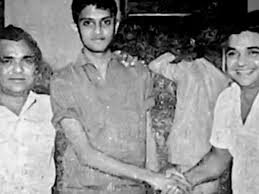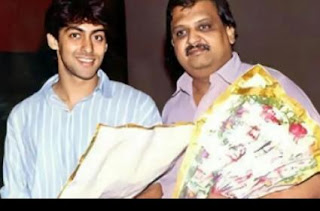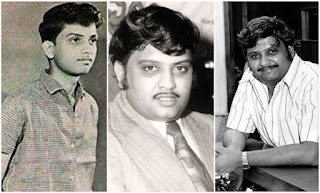PART 4 OF 10: BALU GOES NATIONAL
The year was 1979. The hippies were drifting away. The universalism of the sixties and the seventies was wearing off with them. Democracies had stabilized and military dictators were bringing a semblance of uneasy calm to their territories. India was making a valiant attempt to come out of the gloom of the Emergency. The world seemed to be heading to a better place. Two events, though, would perhaps inextricably change the world for several decades to come.
His cousin was there to help matters to a certain extent. Kasinadhuni Viswanath, popularly known as K Viswanath, was Balu's first cousin and fifteen years his elder. Although he had been directing movies since the sixties, it was with the 1976 socio-cultural masterpiece, 'Siri Siri Muvva' that he catapulted to fame. When my dad bought our first ever television - a black-and-white, Televista Solid State TV; a huge rectangular box that weighed a ton and cost a fortune - we had invited all our Mylapore colony neighbors over to our home, distributed sweets, savories, and filter coffee, and celebrated the occasion by watching the first available program on the lone channel on TV - Doordarshan. It was the movie, 'Siri Siri Muvva'.
In 1979, K Viswanath remade it into 'Sargam', which turned out to be one of the biggest hits that year. In subsequent years, he made landmark movies in Telugu - delicate human stories rooted in Indian culture and fine arts sans the typical melodrama and jingoistic lecturing. These were perhaps the first movies since the advent of talkies that broke the language barrier even in the South. People often think of the South as a monolith. It is not. Like in the rest of India, one has to only step across the border into a neighboring state and lo! Languages, artistic tastes, literacy rates, political affiliations, and matinee idols changed as if with a flip of a switch. K Viswanath was among a handful in the South whose work could get a permit to cross over to neighboring states (Balu was, of course, the foremost example of that).
K Viswanath gave his first cousin the onerous task of singing eight out of the ten Carnatic-based songs for his new movie, 'Shankarabharanam' ('Jewel of Lord Shiva'). He had named his film after the first Melakarta raga in the Carnatic tradition. The movie was based on the story of a famous
classical singer and his journey through life, with a broader message about the state of classical
arts in India.
(P.S. Melakarta ragas are the parent heptatonic scales that form the base of Carnatic music. They are somewhat similar in concept to the thaats of the Hindustani system. There are a total of seventy-two Melakarta ragas. Hindustani uses ten thaats).
I remember watching the movie in jam-packed, sub-urban Jayanthi Theater in Thiruvanmiyur, Madras. I didn't realize it then. But I have perhaps never seen an audience responding to an artsy movie like they did to 'Shankarabharanam', that too in a language they didn't understand. The hero was not Rajnikanth; it was fifty-year old, debutant Somayajalu (he already looked seventy-five). There were no item songs, sensuous heroines partaking in rain dances, or foot-tapping numbers to stop the audience from taking beedi breaks. And yet, K Viswanath managed to keep his audience engrossed purely with the plot tension. And then there was the music and Balu's voice.
When the music was being recorded, composer KV Mahadevan and his assistant Pugazhendhi were confident that Balu was up to the task. Balu wasn't so sure. Pugazhendhi took personal responsibility for coaching Balu and put him through a six-month regimen to prepare the voice that had captivated the south with its "soft" music to sing saint-composers, Thyagaraja and Bhakta Ramadasu's kirtanas, and KV Mahadevan's head-spinning sangatis and swarams. Balu had to manage the training and his sadhana at the near-peak of his career when he was recording between five and ten songs a day.
The movie paid rich dividends for the entire cast and crew. It won numerous state, national, and international awards. Balu won his first National Award for the song, 'Omkara nadhalu' based on the raagam, Shankarabharanam with beautiful lyrics by the legendary Veturi Sudararamamurthy.








Comments
Post a Comment